 The major themes of this story by Herman Bosman are attitudes towards the dead, and equality in death. A Boer farmer and native enemy die side by side while fighting in a ‘Transvaal Kafir War’. When the farmer’s friends return to take his body home for a proper burial, they find that wild animals have mixed up the bones. The friends spend a lot of time trying to sort out which is which so that the dead farmer does not have to lie forever among the warrior’s bones. A yellow ‘kafir’ dog judges the result. Other themes: war, mateship, racism. More…
The major themes of this story by Herman Bosman are attitudes towards the dead, and equality in death. A Boer farmer and native enemy die side by side while fighting in a ‘Transvaal Kafir War’. When the farmer’s friends return to take his body home for a proper burial, they find that wild animals have mixed up the bones. The friends spend a lot of time trying to sort out which is which so that the dead farmer does not have to lie forever among the warrior’s bones. A yellow ‘kafir’ dog judges the result. Other themes: war, mateship, racism. More…
Archives
The Romance of a Busy Broker
 This humorous but unlikely story by O. Henry is set in the office of Harvey Maxwell, a busy New York stockbroker, over the space of a single morning. When Harvey sits down at his desk, it is as if he changes from a man into a machine. He puts everything else out of his mind. It is a bad day on the stock market and, when things get quieter at lunchtime, he realizes that he has forgotten something more important than making money. Themes include the pressure of ‘modern’ business, love, preoccupation, workplace conflict, gender roles. More…
This humorous but unlikely story by O. Henry is set in the office of Harvey Maxwell, a busy New York stockbroker, over the space of a single morning. When Harvey sits down at his desk, it is as if he changes from a man into a machine. He puts everything else out of his mind. It is a bad day on the stock market and, when things get quieter at lunchtime, he realizes that he has forgotten something more important than making money. Themes include the pressure of ‘modern’ business, love, preoccupation, workplace conflict, gender roles. More…
Popular Mechanics (Mine / Little Things)
 As anyone who has witnessed an acrimonious divorce knows, sometimes demands over property settlement and custody of children defy logic. This is often because discussions are driven by anger and a desire to hurt or “get back at” the other party as opposed to fairness and what is best for all. In this short story by Raymond Carver, the only major point of argument seems to be which parent will be the main carer for the couple’s baby. Unfortunately, the simple mechanics of a newly formed human body lead to a “Solomon-like” solution that will not please either of them. More…
As anyone who has witnessed an acrimonious divorce knows, sometimes demands over property settlement and custody of children defy logic. This is often because discussions are driven by anger and a desire to hurt or “get back at” the other party as opposed to fairness and what is best for all. In this short story by Raymond Carver, the only major point of argument seems to be which parent will be the main carer for the couple’s baby. Unfortunately, the simple mechanics of a newly formed human body lead to a “Solomon-like” solution that will not please either of them. More…
A Horse and Two Goats
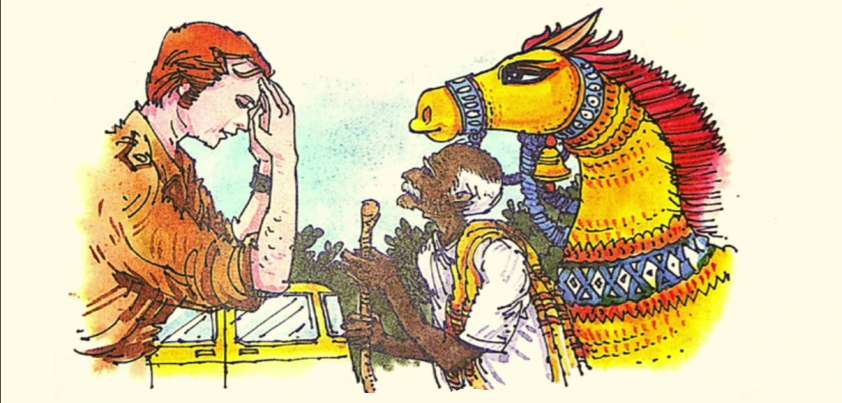 This story from R. K. Narayan is a humorous account of the protagonist (Muri)’s trials and tribulations in a remote Indian village. Its major theme is culture clash (the villagers’ deep spirituality and acceptance of their lot vs. an American’s “money is everything” attitude). Other themes include miscommunication (and how it can sometimes pay off handsomely), change (younger villagers’ loss of appreciation of their cultural heritage, as symbolized by their indifference towards the statue), chauvinism (both men are extremely patronizing towards their wives), and archaeological looting (the American must surely recognize that the statue is of spiritual and/or historical significance!). More…
This story from R. K. Narayan is a humorous account of the protagonist (Muri)’s trials and tribulations in a remote Indian village. Its major theme is culture clash (the villagers’ deep spirituality and acceptance of their lot vs. an American’s “money is everything” attitude). Other themes include miscommunication (and how it can sometimes pay off handsomely), change (younger villagers’ loss of appreciation of their cultural heritage, as symbolized by their indifference towards the statue), chauvinism (both men are extremely patronizing towards their wives), and archaeological looting (the American must surely recognize that the statue is of spiritual and/or historical significance!). More…
The New Food
 The climax of this very short story is the gruesome death of an imaginary baby. If you did not know who wrote it, you might attribute the plot to the playful, postmodernist style of an author like Donald Barthelme. In fact, the story was published way back in 1910. It comes from Canadian humorist Stephen Leacock’s first short story collection, Literary Lapses. A fascinating aspect of the story is its modern relevance. Viewed in the context of today’s world, the story is a wonderful satire of heavily processed convenience foods and the contribution they make towards child obesity. More…
The climax of this very short story is the gruesome death of an imaginary baby. If you did not know who wrote it, you might attribute the plot to the playful, postmodernist style of an author like Donald Barthelme. In fact, the story was published way back in 1910. It comes from Canadian humorist Stephen Leacock’s first short story collection, Literary Lapses. A fascinating aspect of the story is its modern relevance. Viewed in the context of today’s world, the story is a wonderful satire of heavily processed convenience foods and the contribution they make towards child obesity. More…
The Celebrated Jumping Frog
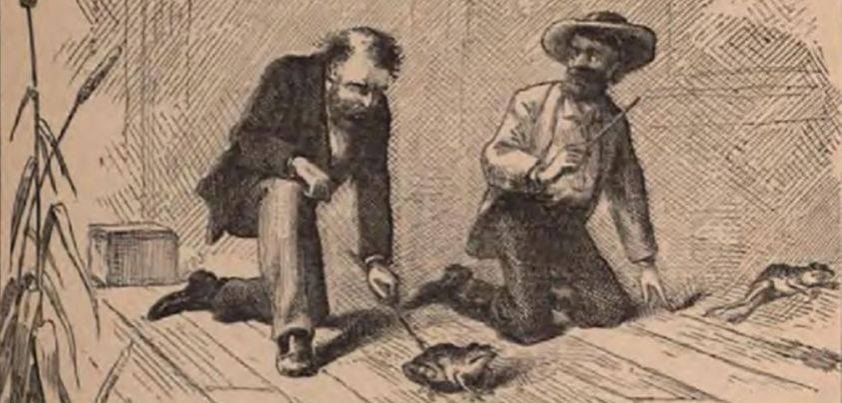 The humorous frame story of this unlikely tale by Samuel Clemens (aka Mark Twain) satirizes the way late nineteenth-century American “Easterners” looked down on their supposedly less sophisticated Western compatriots. In the inner story, a man named Jim loves gambling so much that he will bet on almost anything. He finds a frog he believes can leap further than any other in Calaveras County, and learns an expensive lesson when a passing stranger bets against his frog and wins easily. Themes include regional stereotypes, storytelling (tall-tales), gambling consequences (there’s no such thing as a sure bet), trickery and deception. More…
The humorous frame story of this unlikely tale by Samuel Clemens (aka Mark Twain) satirizes the way late nineteenth-century American “Easterners” looked down on their supposedly less sophisticated Western compatriots. In the inner story, a man named Jim loves gambling so much that he will bet on almost anything. He finds a frog he believes can leap further than any other in Calaveras County, and learns an expensive lesson when a passing stranger bets against his frog and wins easily. Themes include regional stereotypes, storytelling (tall-tales), gambling consequences (there’s no such thing as a sure bet), trickery and deception. More…
The 13-Carat Diamond
 Khin Mya (aka Khin Myo Chit) is one of a small number of recognized Burmese (now Myanmars) authors who wrote in English as well as their native tongue. The story takes place during World War II at the time the Japanese occupied Burma. It tells of the humorous experiences of a young couple who are finding it hard to make ends meet. The woman fails at running a market stall, and comes up with a plan to become rich overnight. All she has to do is find someone with a 13-carat diamond they are willing sell. More…
Khin Mya (aka Khin Myo Chit) is one of a small number of recognized Burmese (now Myanmars) authors who wrote in English as well as their native tongue. The story takes place during World War II at the time the Japanese occupied Burma. It tells of the humorous experiences of a young couple who are finding it hard to make ends meet. The woman fails at running a market stall, and comes up with a plan to become rich overnight. All she has to do is find someone with a 13-carat diamond they are willing sell. More…
The Loaded Dog
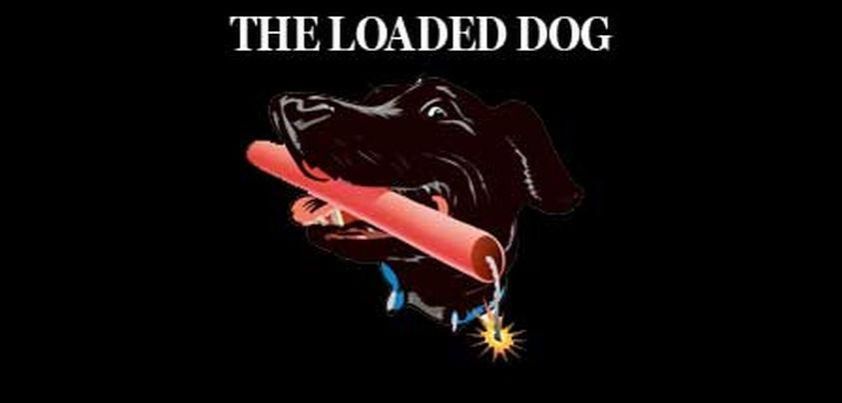 This is one of the best-known stories by Australian poet and writer, Henry Lawson. It takes place in the late 1800s and involves three men and their big, lovable retriever pup. The men are working together digging for gold and like to go fishing in their free time. When the fish stop biting, they decide to catch them by making a bomb and exploding it in the water. The pup picks up the bomb, accidentally lights the fuse as he runs past the campfire, and has great fun chasing the men around the gold fields trying to give it back. More…
This is one of the best-known stories by Australian poet and writer, Henry Lawson. It takes place in the late 1800s and involves three men and their big, lovable retriever pup. The men are working together digging for gold and like to go fishing in their free time. When the fish stop biting, they decide to catch them by making a bomb and exploding it in the water. The pup picks up the bomb, accidentally lights the fuse as he runs past the campfire, and has great fun chasing the men around the gold fields trying to give it back. More…
Answer
 A goodreads.com reviewer aptly describes Answer by Fredric Brown as one of the most concise SciFi horror stories I have ever read. There are uncanny similarities between the new supercomputer’s response to the first question asked of it and the final sentence of Isaac Asimov’s The Last Question. Both stories were published in the mid-1950s and reflect concerns about the future influence of computers on society. Some reviewers suggest that Brown’s one cybernetics machine that combines all the knowledge of all the galaxies already exists… it’s called the Internet! Themes include scientific hubris, the dangers of technology, unintended consequences. More…
A goodreads.com reviewer aptly describes Answer by Fredric Brown as one of the most concise SciFi horror stories I have ever read. There are uncanny similarities between the new supercomputer’s response to the first question asked of it and the final sentence of Isaac Asimov’s The Last Question. Both stories were published in the mid-1950s and reflect concerns about the future influence of computers on society. Some reviewers suggest that Brown’s one cybernetics machine that combines all the knowledge of all the galaxies already exists… it’s called the Internet! Themes include scientific hubris, the dangers of technology, unintended consequences. More…
In the Withaak’s Shade
 Like a number of Herman Bosman‘s Oom Schalk Lourens stories, In the Withaak’s Shade is a satire of the life of Bushveld Afrikaners embellished in the form of a “tall tale”. It tells of a farmer’s unlikely encounter with a leopard as he was lying down under a withaak tree while busily searching for some lost cattle. Several of Bosman’s common themes (storytelling and the indolence, independence and mateship of the Boer landowners) are obvious. Two others (the mass hysteria that follows the reported sighting, and destruction of wildlife) are not. More…
Like a number of Herman Bosman‘s Oom Schalk Lourens stories, In the Withaak’s Shade is a satire of the life of Bushveld Afrikaners embellished in the form of a “tall tale”. It tells of a farmer’s unlikely encounter with a leopard as he was lying down under a withaak tree while busily searching for some lost cattle. Several of Bosman’s common themes (storytelling and the indolence, independence and mateship of the Boer landowners) are obvious. Two others (the mass hysteria that follows the reported sighting, and destruction of wildlife) are not. More…
A Joke
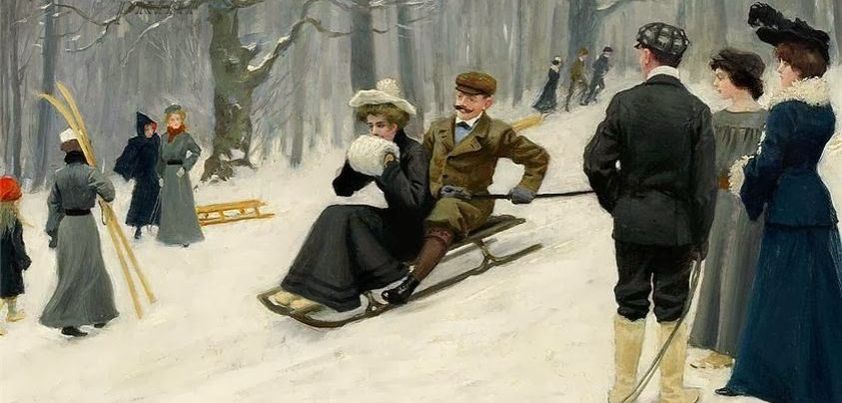 In this story by Anton Chekhov, a young man plays a trick on a terrified lady-friend by whispering a ghostly I love you as they speed down a mountain on a toboggan. Unsure of what she heard, the woman asks the man to repeat the ride over and over. Each time they do so, he whispers the same words. Soon it becomes an obsession and every day she wants to go up the mountain to listen for the words. Her reaction when she thinks she has the answer is a surprise. Themes include fear, innocence, playful deception, confusion, obsession, regret. More…
In this story by Anton Chekhov, a young man plays a trick on a terrified lady-friend by whispering a ghostly I love you as they speed down a mountain on a toboggan. Unsure of what she heard, the woman asks the man to repeat the ride over and over. Each time they do so, he whispers the same words. Soon it becomes an obsession and every day she wants to go up the mountain to listen for the words. Her reaction when she thinks she has the answer is a surprise. Themes include fear, innocence, playful deception, confusion, obsession, regret. More…
The Mouse
 This story by Saki satirizes the social sensitivities of the late-Victorian/Edwardian middle class. A prudish young man who has had a sheltered upbringing returns to the city from a farm visit. Sharing his train compartment is a woman who appears to be sleeping. He soon finds they are not alone… he has a mouse in his pants! To avoid offending the woman and causing a scene, he removes his trousers by hiding behind a blanket. Unfortunately, the blanket falls before can he put them on again and the woman wakes up. Themes include propriety, embarrassment, dissimulation, insensitivity towards others. More…
This story by Saki satirizes the social sensitivities of the late-Victorian/Edwardian middle class. A prudish young man who has had a sheltered upbringing returns to the city from a farm visit. Sharing his train compartment is a woman who appears to be sleeping. He soon finds they are not alone… he has a mouse in his pants! To avoid offending the woman and causing a scene, he removes his trousers by hiding behind a blanket. Unfortunately, the blanket falls before can he put them on again and the woman wakes up. Themes include propriety, embarrassment, dissimulation, insensitivity towards others. More…
The Catbird Seat
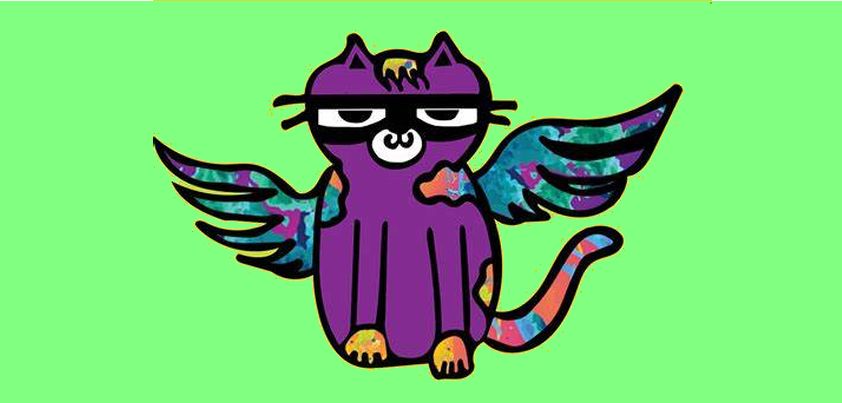 Set in 1940s New York, this story by James Thurber is a not-so-gentle satire of the lengths to which desperate people will go to resist change. A meek, solitary man believes the brash efficiency expert brought in to streamline his employer’s workflows threatens his job and must be “rubbed out”. He plans what he considers an almost perfect murder, only to be thwarted at the last moment by lack of a weapon. Fortunately, in a moment of inspiration, he turns the tables and puts himself in the “Catbird Seat”. Themes: workplace gender stereotypes, alienation, change, insecurity, desperation, revenge. More…
Set in 1940s New York, this story by James Thurber is a not-so-gentle satire of the lengths to which desperate people will go to resist change. A meek, solitary man believes the brash efficiency expert brought in to streamline his employer’s workflows threatens his job and must be “rubbed out”. He plans what he considers an almost perfect murder, only to be thwarted at the last moment by lack of a weapon. Fortunately, in a moment of inspiration, he turns the tables and puts himself in the “Catbird Seat”. Themes: workplace gender stereotypes, alienation, change, insecurity, desperation, revenge. More…
Master Jacob
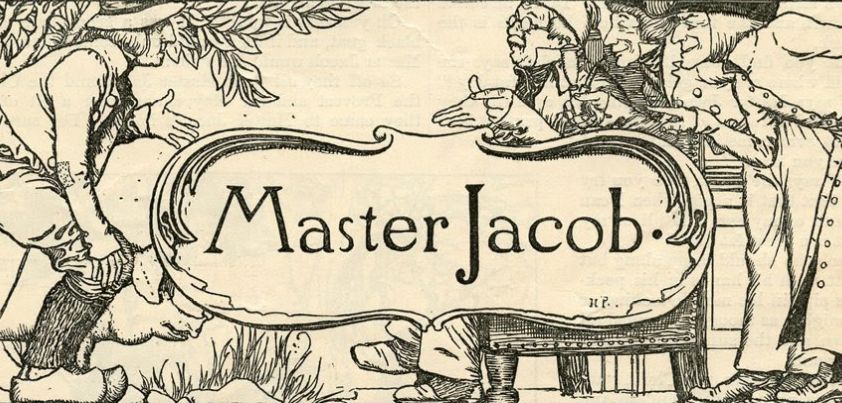 The story by Howard Pyle is similar to the “trickster” narratives found in many folktales. Three greedy community leaders (a priest, a provost, and the town mayor) decide to trick an unsuspecting farmer out of a fat pig (or is it a dog?) he is taking to market. Later, the sly farmer turns the tables with three tricks of his own. For his last trick, he tells them the truth! The tricksters woe their foolishness at the bottom of a deep pit, and the farmer ends up with a lot of their money. Themes: greed, cleverness, revenge, distrust. More…
The story by Howard Pyle is similar to the “trickster” narratives found in many folktales. Three greedy community leaders (a priest, a provost, and the town mayor) decide to trick an unsuspecting farmer out of a fat pig (or is it a dog?) he is taking to market. Later, the sly farmer turns the tables with three tricks of his own. For his last trick, he tells them the truth! The tricksters woe their foolishness at the bottom of a deep pit, and the farmer ends up with a lot of their money. Themes: greed, cleverness, revenge, distrust. More…
Borrowing a Match
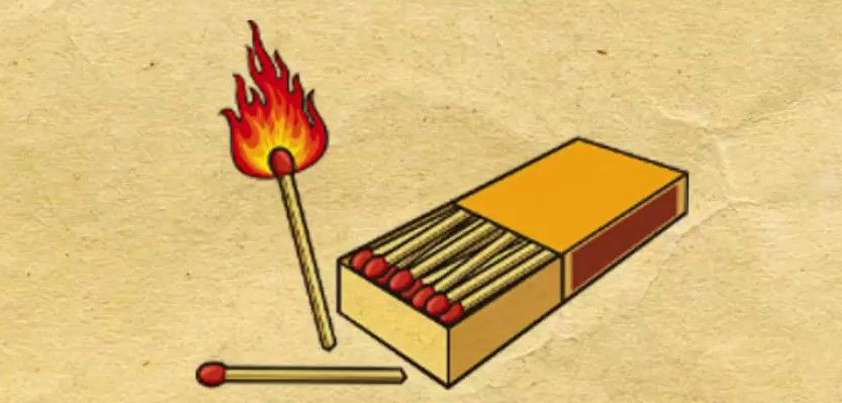 Have you ever asked someone if you could borrow something, and then watched them go to so much trouble looking for it that you wish you hadn’t asked? If so, you will understand the building frustration of the man in this Stephen Leacock story. All he asked of a “decent, ordinary-looking” stranger was the loan of a match. In the process of looking for one, the stranger destroys his overcoat and the parcels and letters he is carrying, and then threatens to beat his young son when he gets home. Finally, . . . (you’ll have to read the story to find out!) More…
Have you ever asked someone if you could borrow something, and then watched them go to so much trouble looking for it that you wish you hadn’t asked? If so, you will understand the building frustration of the man in this Stephen Leacock story. All he asked of a “decent, ordinary-looking” stranger was the loan of a match. In the process of looking for one, the stranger destroys his overcoat and the parcels and letters he is carrying, and then threatens to beat his young son when he gets home. Finally, . . . (you’ll have to read the story to find out!) More…
Bigfoot Stole My Wife / I Am Bigfoot
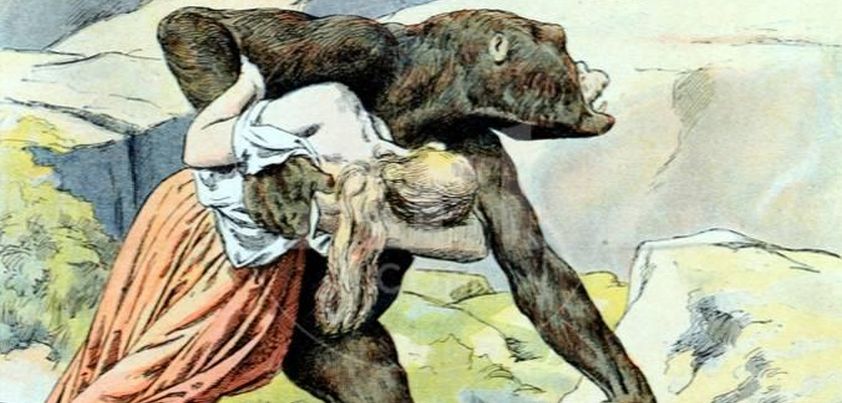 Today we have two linked stories from Ron Carlson: Bigfoot Stole My Wife and I am Bigfoot. In the first, despite a host of context clues suggesting that the protagonist’s wife has left him, shame and denial lead him to believe that the legendary Bigfoot has abducted her. Using flawed logic, he argues that this must be true because another seemingly impossible event in his life was also true. The story opens with the line: “The problem is credibility.” In the ironic second story, credibility comes as Bigfoot issues a fearful warning to all men of the world. More…
Today we have two linked stories from Ron Carlson: Bigfoot Stole My Wife and I am Bigfoot. In the first, despite a host of context clues suggesting that the protagonist’s wife has left him, shame and denial lead him to believe that the legendary Bigfoot has abducted her. Using flawed logic, he argues that this must be true because another seemingly impossible event in his life was also true. The story opens with the line: “The problem is credibility.” In the ironic second story, credibility comes as Bigfoot issues a fearful warning to all men of the world. More…
They’re Made Out Of Meat
 At first read, this very short story by Terry Bisson appears to be a humorous exchange with little substance. Two alien space explorers are discussing whether to make contact with a newly discovered intelligent life form. They are uneasy about it because the life form seems to be composed entirely of meat. The major theme of the story is prejudice: the aliens consider themselves above all other life. How can beings so different to them be capable of such advanced thought? Also, an interesting dietary theme: Is it right that one sentient life form (man) kills and eats others (animals)? More…
At first read, this very short story by Terry Bisson appears to be a humorous exchange with little substance. Two alien space explorers are discussing whether to make contact with a newly discovered intelligent life form. They are uneasy about it because the life form seems to be composed entirely of meat. The major theme of the story is prejudice: the aliens consider themselves above all other life. How can beings so different to them be capable of such advanced thought? Also, an interesting dietary theme: Is it right that one sentient life form (man) kills and eats others (animals)? More…
Passing Wind
 For me, the most enjoyable aspect of this humorous flash story from Lydia Davis is that it describes an embarrassing situation we have all probably encountered: after going to great lengths to silently pass wind among a group of strangers, the smell gives us away. Do we say nothing, excuse ourselves, or immediately cast a dirty look at the person standing next to us? Here the narrator faces a slightly different dilemma. She tries to think of a polite way to let a guest know that if he didn’t do it, then it wasn’t her but the dog. More…
For me, the most enjoyable aspect of this humorous flash story from Lydia Davis is that it describes an embarrassing situation we have all probably encountered: after going to great lengths to silently pass wind among a group of strangers, the smell gives us away. Do we say nothing, excuse ourselves, or immediately cast a dirty look at the person standing next to us? Here the narrator faces a slightly different dilemma. She tries to think of a polite way to let a guest know that if he didn’t do it, then it wasn’t her but the dog. More…
Luck
 As the name implies, the major theme of Luck by Samuel Clemens (aka Mark Twain) is just that — Luck! Its main message is that good fortune can result in the most unlikely people achieving greatness. Other themes include envy and injustice. The clergyman envies Lieutenant General Lord Arthur Scoresby, V.C., K.C.B., etc. for his successes in life… especially on the battlefield where, in reality, he didn’t seem to know back from forwards and right from left. There is also a sense of injustice in that the General appears to show no appreciation for the clergyman’s role in his success. More…
As the name implies, the major theme of Luck by Samuel Clemens (aka Mark Twain) is just that — Luck! Its main message is that good fortune can result in the most unlikely people achieving greatness. Other themes include envy and injustice. The clergyman envies Lieutenant General Lord Arthur Scoresby, V.C., K.C.B., etc. for his successes in life… especially on the battlefield where, in reality, he didn’t seem to know back from forwards and right from left. There is also a sense of injustice in that the General appears to show no appreciation for the clergyman’s role in his success. More…
Dragon, Dragon
 The central theme of this humorous story by John Gardner is to respect the views of one’s elders. A dragon ravages a medieval kingdom with some modern touches (clocks, novels, cars and cigars). When the king’s knights and wizard prove ineffective, he calls a town meeting to ask for ideas, promising his daughter’s hand and half his kingdom to anyone who can slay the dragon. After the two older sons of a wise cobbler ignore their father’s advice and fail, their nervous younger son heeds his words and succeeds. Other themes include social class, honor, and courage (overcoming one’s fears). More…
The central theme of this humorous story by John Gardner is to respect the views of one’s elders. A dragon ravages a medieval kingdom with some modern touches (clocks, novels, cars and cigars). When the king’s knights and wizard prove ineffective, he calls a town meeting to ask for ideas, promising his daughter’s hand and half his kingdom to anyone who can slay the dragon. After the two older sons of a wise cobbler ignore their father’s advice and fail, their nervous younger son heeds his words and succeeds. Other themes include social class, honor, and courage (overcoming one’s fears). More…